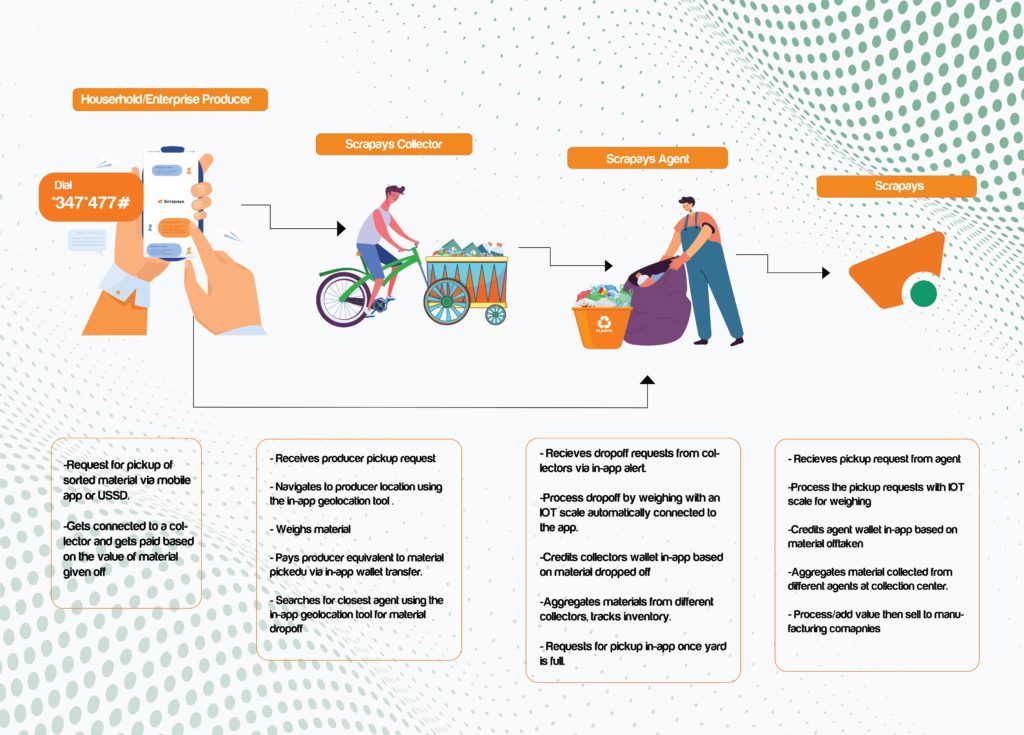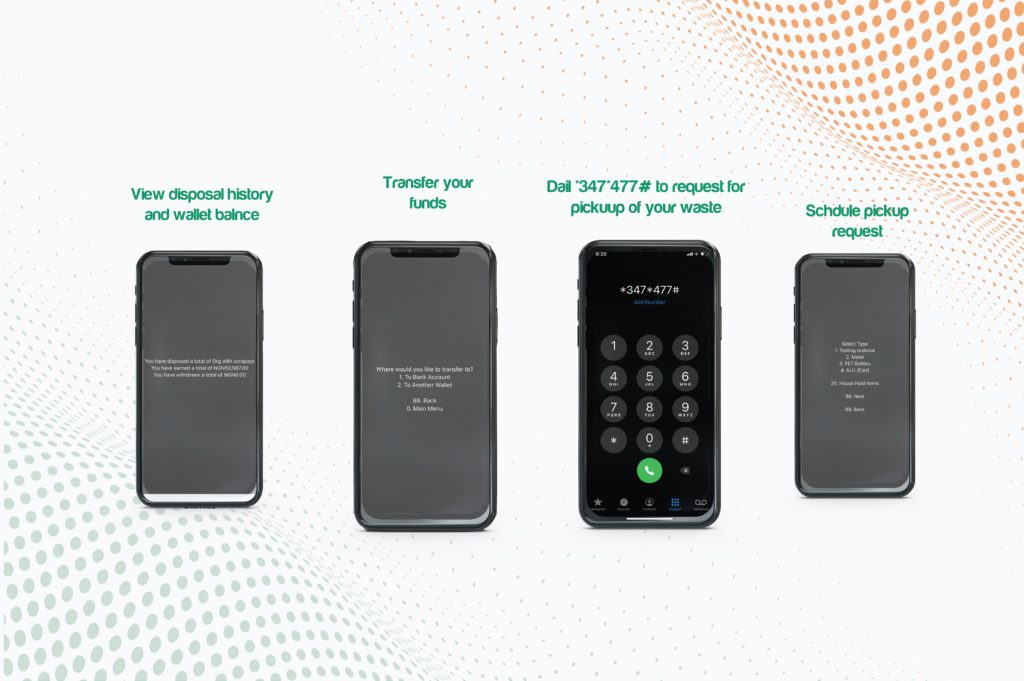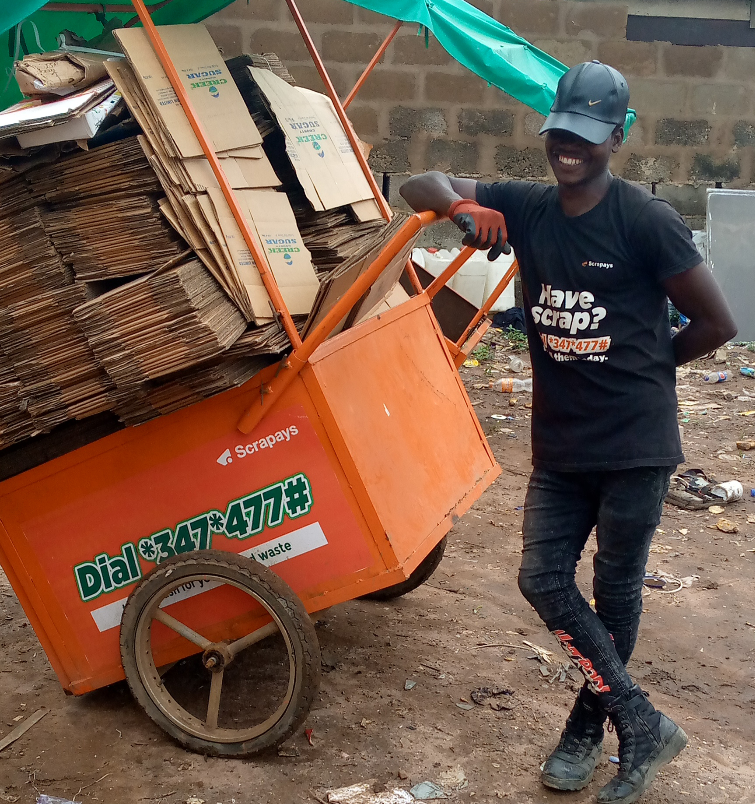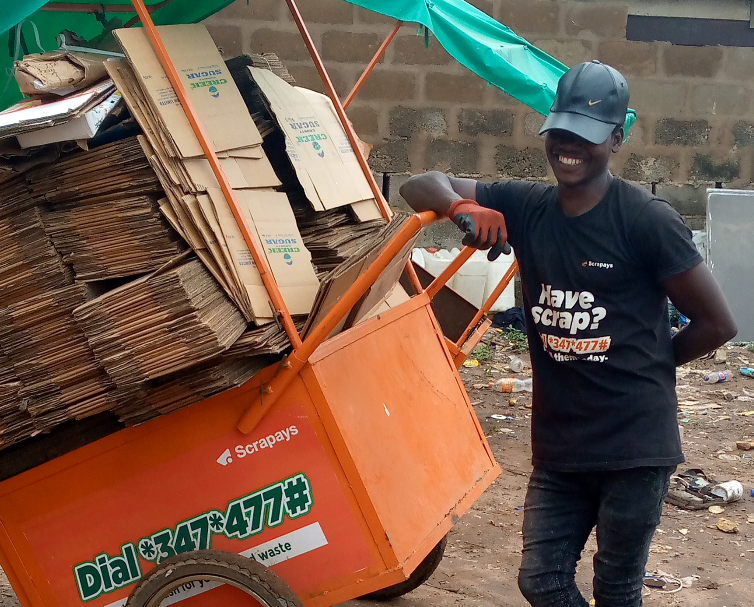Being the most populous country in Africa, Nigeria faces a number of urban challenges and uncollected trash is high on the list. Waste collection methods driven by local authorities remain inadequate, particularly in rural areas. Furthermore, most Nigerians are not inclined to collect and dispose of their waste properly.
In Lagos, for instance, where trash volume grows by 15,000 tons daily, only 40% of waste generated is collected and just 13% is recycled each year. The rest – including materials that could feed the local recycling industry – litters the streets and clogs open drains.
Over the past few years, trash-for-cash initiatives have emerged in Nigeria, looking to tackle the widespread waste problems by incentivising Nigerians while supplying recycling plants with much-needed materials for processing. One such is Scrapays, founded by Boluwatife Arewa, Tope Sulaimon, and Olumide Ogunleye, all graduates of the Federal University of Technology Akure (FUTA).
“It all started as a project when Tope, Olumide, and I were still undergraduates at FUTA,” Arewa told TechCabal. “As geoscience students, we understood the environmental impact of waste and thought up a solution. It was called Panti (Yoruba term for waste) initially and during our final year in school, we got into a national program.”
The undergraduate project evolved and became Scrapays, a startup using technology to facilitate a decentralised ecosystem for recovering recyclable waste in Nigeria.
“The company has changed but the ideology remains the same; we see waste as a commodity or even better, currency,” Arewa said.
How does Scrapays work?
Scrapays’ decentralised model fuses technology, finance, and recycling. It serves two broad sets of users – waste producers and recycling businesses.
Waste producers are categorized as individuals, SMEs, and enterprises that churn out recyclable waste daily and accumulate them for lengthy periods before requesting for pickup through Scrapays’ online or offline channels; including the USSD shortcode (*347*477#), mobile app, and website.
On the business side are mobile collectors – typically young, low-income Nigerians – that fulfill on-demand recovery requests from waste producers within an area. The group, mostly composed of existing informal waste pickers but open to interested individuals, are equipped with portable IoT-enabled scales, customised carts (which they get upon registration and pay for over a nine-month period), and a designated app.
After a waste producer requests a pick-up, the nearest Scrapays collector receives and accepts the request via the app. At the point of collection, sorted waste items are weighed using the digital scales, which communicate the weight (in kilogram) and monetary value on the mobile app.

Then there are agents who provide temporary storage facilities for recyclable materials retrieved by collectors. Scrapays allows existing or new businesses and individuals to sign up as agents and make money off their empty spaces for every kilogram of material stored on it. Arewa refers to this model as “AirBnB for recyclables.”
“Just like Uber made driving a profession or side hustle for some, even though you weren’t a driver before, Scrapays provides a platform for people currently in recycling businesses or want to go into the business,” he said.
“Both collectors and agents manage their operations through our designated apps, with features like Wallet transfer, collector and agent mapping, account funding, and more.”
From the agents’ facilities, logistics partners transport the recyclable waste categories collected to a centralised processing space and sell them off to several local companies that convert the material into finished products. Some manufacturers make tissue paper from waste paper; others use plastics to make fiber for the clothing and textile market; and a few companies recycle glass, metal, copper, and aluminum.
The financial reward of recycling waste
Using a wallet-based system, Scrapays operates a revenue-sharing model that allows all stakeholders in the value chain – from producers to all its partners – to earn commission per kilogram recovered.
Waste producers get paid directly in mobile wallets and funds can be redeemed in cash or directly transferred to the individual’s account. They can also be used to buy airtime or make purchases on Scrapays’ partner marts.
For every kilogram of recovered recyclables, collectors get paid a 19% commission. The commission rate for agents is set at 11% for every kg of waste received and verified.

Digitising informal recycling
In Nigeria, the bulk of recyclable waste collection and processing is carried out by informal waste pickers and processors, with unregistered SMEs dominating the billion-dollar recycling sector.
Scrapays’ platform helps these informal players manage their funds and operations; improve the waste material collection process by minimising human interference; and mitigate typical losses involved in the supply chain.
“In Lagos alone, over two million of these businesses exist,” he said. “What we do is provide them with the infrastructure and tools to help them control recyclable material recovery while creating sustainable self-managed businesses from it.”
The web platform also has a list feature, which serves as an online marketplace for industrial listing and trade of recyclables (plastic, metal, lead, copper, aluminum, paper) and “out of use” machinery, cars, trucks, and equipment.

“The informal guys account for 99% of whatever is recovered and recycled. Their model is what works, they reach the nook and cranny of the country and do recycling effectively. Why not create a system around that and make it scalable?” Arewa said. “Our platform has simply formalised and created a structure around informal recycling.”
Scaling the solution
Scrapays has been in operation for about ten months, after an initial test period of six months. It currently has 3,000 registered waste producers (households and enterprises) across Lagos and Ogun State, and has recovered about 270,000 kilograms of recyclable materials.
The startup’s operations have been financed through an internal convertible fund from an angel investor, loans, and founders’ capital. But Arewa has grander plans for the startup, which will require raising significant capital over the next couple of years.
Scrapays aims to be in not less than 22 cities in Nigeria over the next 18 months; 10 countries in Africa in 24 months; and five countries in Southeast Asia in 36 months.
“What we’re solving isn’t just a Nigerian or African challenge. The same problem is faced in Southeast Asia and Latin America. The per capita municipal solid waste (MSW) generation in the ASEAN region is one of the highest in the world,” he said. “At scale, our solution cuts across every developing nation and we’re building in a way that it can be implemented everywhere.”
Arewa is also looking to promote a recycling culture among Nigerians, which would significantly increase the amount of waste collected, as the current volume recovered falls short of the demand for recyclables. “At the moment, we’re not able to meet the demand for recyclables, which is why expanding the collection network and producer sensitisation are extremely important over the next few months.”
Nigeria’s population is estimated to double by 2050; that’s most likely to result in more solid waste hanging around and more items for recycling. As Scrapays’ collectors move around streets fulfilling pick-up requests, the startup’s low-tech, high-impact solution is addressing health, poverty, and urban resilience issues in Africa’s largest country, one city at a time.
If you enjoyed reading this article, please share it in your WhatsApp groups and Telegram channels.




















